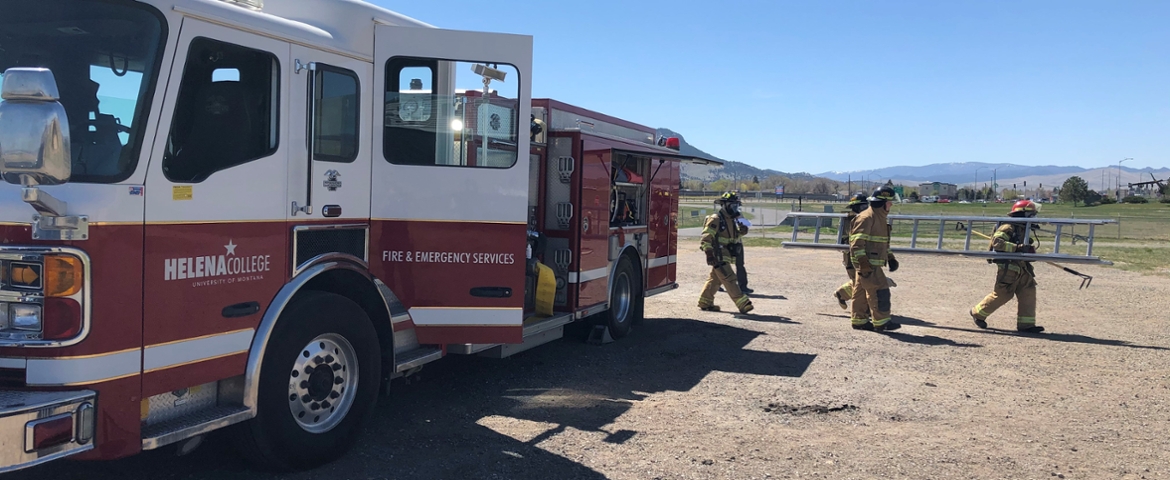The Fire and Emergency Services program is designed to prepare graduates for entry into the challenging and competitive field of fire and emergency services. The program is a unique combination of a well-rounded general education core and hand-on firefighting classes leading to professional certification. The required classes in the program are also aligned with the pre-requisites for many Paramedic programs.
Certifications included in the program:
- IFSAC/Pro Board Firefighter 1
- IFSAC/Pro Board Firefighter 2
- IFSAC/Pro Board Hazardous Materials Operations
- IFSAC/Pro Board Driver/Operator Pumping Apparatus
- Wildland Firefighter Type 2
Upon successful completion of the A.S. in Fire & Emergency Services program, a student will be able to:
- Demonstrate professional conduct by displaying a positive work ethic, flexibility, teamwork, physical fitness, safety consciousness, and sensitivity to diversity.
- Demonstrate basic fire fighter skills in the areas of structural firefighting, wildland firefighting, hazardous materials, and emergency response.
- Effectively communicate and interact in the workplace as well as in the community.
- Be able to function at the NFPA 1001 Fire Fighter I Level
- Be able to function at the NFPA 1001 Fire Fighter II Level
- Demonstrate basic knowledge of fire protection systems, fire prevention, and technical rescue techniques.
The program includes options for a 1-year Certificate of Applied Science (C.A.S.) and a 2-year Associate of Science (A.S.) degree in Fire and Emergency Services. All of the courses included in the 1-year Certificate of Applied Science are fully transferable to the 2-year A.S. degree. A student that has earned the C.A.S. in Fire and Emergency Services can continue directly into the second year of the A.S. in Fire and Emergency Services degree program.
Please note that firefighting and this program are inherently physically demanding. Classes involve lifting heavy loads, climbing ladders, wearing a self-contained breathing apparatus (SCBA), and working in both hot and cold conditions. All students must submit the following forms prior to starting the program: physical exam, respirator use, immunization.
Many fire departments will do an extensive criminal background check and psychological exam prior to making job offers. With the competitive nature of fire service hiring, many criminal offenses will disqualify applicants from fire service positions as well as from your ability to obtain Emergency Medical Technician (EMT) licensure. State law prohibits hiring firefighters who have been imprisoned.
Licensure as an EMT is required for many Fire & Emergency Services career opportunities. ECP 130 Emergency Medical Technician is a strongly recommended elective for the Fire & Emergency Services program students that do not have an EMT license.
Residency Programs and Scholarship Opportunities
In addition to our main campus program in Helena, Montana, Helena College has partnered with fire departments in Livingston and Frenchtown, Montana to offer students the opportunity to earn an Associate of Science in Fire and Emergency Services while living and working in a fire station as a resident volunteer. Courses are delivered at the fire department with occasional lab experiences conducted at Helena College in Helena, Montana.
Benefits of the Residency Program can include:
- Room and board
- Potential for full or partial scholarships
- Additional training opportunities
- Experience and skill refinement staffing working fire stations and responding to emergency incidents
Please note that the admissions processes for residency programs are separate and independent from Helena College and that admission into Helena College does not guarantee acceptance into residency programs.
Contact Us
Nolan Eggen, Fire & Emergency Services Instructor
Phone: (406) 447-6982
Email: Nolan.Eggen@helenacollege.edu
Program cost
Students should budget for the following costs:
- Tuition and fees which are based on the number of registered credit hours, and are paid each semester.
- The Fire program has a program fee of $50 per semester as well as fees attached to some courses. These fees cover materials, supplies, and testing and are paid each semester.
- Textbooks may be required.
- Helena College provides students with the majority of gear needed for the program including turnout pants and coat, a helmet, mask, and SCBA. Click here for the required equipment list.
Fire and Rescue Degree Planning Sheets
Questions about the Fire and Rescue Program? Reach out to one of our Admissions Counselors via phone, 406-447-6900, or email, admissions@helenacollege.edu
